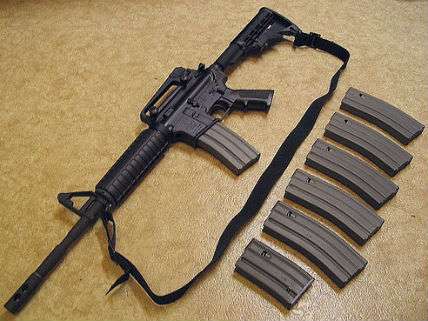Lawsuit Against Suppliers of the Rifle Used in the Sandy Hook Massacre Will Proceed
The Connecticut Supreme Court rejects an absurdly broad definition of "negligent entrustment" but allows a claim based on "unfair trading practices."

Today the Connecticut Supreme Court revived a lawsuit against the manufacturer of the rifle used in the 2012 massacre at Sandy Hook Elementary School in Newtown, the company that distributed the gun, and the store that sold it to the perpetrator's mother. The court agreed with the trial judge that the plaintiffs, a survivor of the attack and relatives of nine people murdered at the school, could not sue under a theory of "negligent entrustment." But it said they could sue under the theory that Remington, which owns the company that makes the Bushmaster XM15-E2S rifle used by Sandy Hook shooter Adam Lanza, violated the Connecticut Unfair Trade Practices Act (CUTPA) by marketing the gun, a variation on the Colt AR-15, in a way that emphasized its "militaristic and assaultive qualities."
Under CUTPA, people can seek damages for injuries caused by "unfair methods of competition and unfair or deceptive acts or practices in the conduct of any trade or commerce." The Connecticut Supreme Court disagreed with Superior Court Judge Barbara Bellis, who in 2016 ruled that the plaintiffs could not sue under CUTPA because they did not have a "consumer or commercial relationship" with the defendant. It also concluded that CUTPA lawsuits are not barred by a federal law that generally protects gun suppliers from civil liability for crimes committed with their products.
The Protection of Lawful Commerce in Arms Act (PLCAA), which Congress passed in 2005, allows civil actions based on knowing violations of "a State or Federal statute applicable to the sale or marketing of the product" when the violations were "a proximate cause" of harm. "Once we accept the premise that Congress did not intend to immunize firearms suppliers who engage in truly unethical and irresponsible marketing practices promoting criminal conduct," the court said, "it falls to a jury to decide whether the promotional schemes alleged in the present case rise to the level of illegal trade practices and whether fault for the tragedy can be laid at their feet."
The plantiffs cite these examples of "unethical and irresponsible marketing practices":
The defendants unethically promoted their assault weapons for offensive, military style missions by publishing advertisements and distributing product catalogs that (1) promote the AR-15 as ''the uncompromising choice when you demand a rifle as mission adaptable as you are,'' (2) depict soldiers moving on patrol through jungles, armed with Bushmaster rifles, (3) feature the slogan ''[w]hen you need to perform under pressure, Bushmaster delivers,'' superimposed over the silhouette of a soldier holding his helmet against the backdrop of an American flag, (4) tout the ''military proven performance'' of firearms like the XM15-E2S, (5) promote civilian rifles as ''the ultimate combat weapons system,'' (6) invoke the unparalleled destructive power of their AR-15 rifles, (7) claim that the most elite branches of the United States military, including the United States Navy SEALs, the United States Army Green Berets and Army Rangers, and other special forces, have used the AR-15, and (8) depict a close-up of an AR-15 with the following slogan: ''Forces of opposition, bow down. You are single-handedly outnumbered.''
The lawsuit argues that such messages would appeal to a troubled young man like Lanza, that they may have influenced him to choose the XM15 from among his mother's guns when he attacked the elementary school, and that the attack would have been less deadly if he had used a different gun. All of those claims are questionable, and it is hard to see how a reasonable jury, even if it found the Bushmaster ads distasteful, could conclude that they were "a proximate cause" of mass murder. But thanks to this ruling, the plaintiffs will have a chance to make that case.
The legal theory that the court rejected, which aimed to take advantage of another exception to the PLCAA's protection, was potentially much more threatening to the gun industry. The plaintiffs argued that supplying military-style rifles to civilians in itself qualifies as negligent entrustment, a cause of action that involves transferring a "dangerous instrumentality" to someone whom the defendant knows or should know is apt to cause harm with it. According to the lawsuit, the business of selling "modern sporting rifles" to the general public is one giant tort, even though these guns are very rarely used to commit crimes.
Judge Bellis concluded in 2016 that such a breathtakingly broad understanding of negligent entrustment is at odds with Connecticut common law and with the PLCAA, which defines the cause of action as "the supplying of a qualified product by a seller for use by another person when the seller knows, or reasonably should know, the person to whom the product is supplied is likely to, and does, use the product in a manner involving unreasonable risk of physical injury to the person or others." The rifle in this case was purchased by Lanza's mother, and there was no reason to suspect she was such a person. The Connecticut Supreme Court agreed with Bellis: "We expressly reject the plaintiffs' theory that, merely by selling semiautomatic rifles—which were legal at the time—to the civilian population, the defendants became responsible for any crimes committed with those weapons."


Show Comments (106)